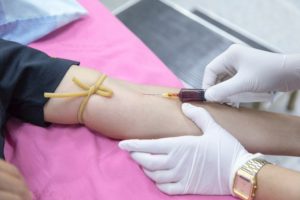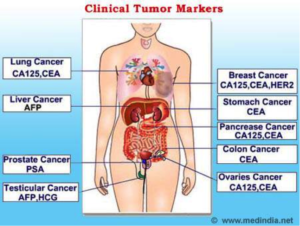Every day, I will definitely meet with at least one patient coming to my clinic for a second opinion about raised tumour marker level. Instead quite a number of them have very mildly raised tumor marker.
Do I have the cancer?
How accurate is the tumour marker test?
 Tumour markers are substances that are produced by cancer or by other cells of the body in response to cancer or some benign or noncancerous conditions. Most tumor markers are made by normal cells as well as by cancer cells; however, they are produced at much higher levels in cancerous conditions. These substances can be found in the blood, urine, stool, tumor tissue, or other tissues or bodily fluids of some patients with cancer.
Tumour markers are substances that are produced by cancer or by other cells of the body in response to cancer or some benign or noncancerous conditions. Most tumor markers are made by normal cells as well as by cancer cells; however, they are produced at much higher levels in cancerous conditions. These substances can be found in the blood, urine, stool, tumor tissue, or other tissues or bodily fluids of some patients with cancer.
There are many different types of tumour markers, including:
- Alpha-fetoprotein (AFP) for hepatocellular carcinoma.
- Carbohydrate antigen 19-9 (CA19-9) for pancreatic and gastrointestinal cancers.
- Carcinoembryonic antigen (CEA) for colorectal cancers.
- Cancer antigen 15-3 (CA15-3)a marker for breast cancer.
- Human chorionic gonadotropin (hcg or beta-hcg) for gestational trophoblastic tumors and some germ cell tumors.
- Prostate-specific antigen (PSA) for prostate cancer.
- Chromogranin A, a marker for neuroendocrine tumor.
- Cancer antigen 125 (CA125) for ovarian cancer and others

High tumour marker levels can be a sign of cancer. However, this alone is not enough to diagnose cancer. Measurements of tumour markers are always combined with other tests, such as biopsies or radiological procedures, to diagnose cancer.
A condition or disease other than cancer can raise tumour marker levels. In the other word, some tumour marker levels may be high in people without cancer. Some cancers do not make tumour markers that are found in the blood. This includes cancers with no known tumour markers.
The level of a tumour marker may not rise until the cancer worsens. Also, some patients do not have high tumour marker levels even if they have cancer that usually makes tumour markers. For example, carcinoembryonic antigen (CEA) is a tumor marker used in colon cancer, yet only 70-80% of colon cancers make CEA. This means 20-30% of people with colon cancer will not have a raised CEA level. Only a quarter of early stage colon cancers have a raised CEA.
In asymptomatic subjects but, with high risk, tumour markers are potentially used in screening for early malignancy. In symptomatic patients, markers may help in the differential diagnosis of benign and malignant disease. Following diagnosis and surgical removal of a malignancy, markers may be used for assessing prognosis, postoperative surveillance, therapy prediction and monitoring response to systemic therapy.
Tumour markers are not recommended for screening asymptomatic patients without risk for cancer because they generally:
- Lack specificity – many patients may have a raised level due to benign disease
- Lack sensitivity – many patients with cancer will have a normal result
As a patient, please consult your doctor for the right option of screening or diagnostic approach of a certain disease or cancer. And as a doctor, we should adhere strictly to the screening or diagnosis guidelines.
Reference
Duffy M.J. Tumor Markers in Clinical Practice: A Review Focusing on Common Solid Cancers. Med Princ Pract 2013;22:4–11
[This article belongs to The Malaysian Medical Gazette. Any republication (online or offline) without written permission from The Malaysian Medical Gazette is prohibited.]
